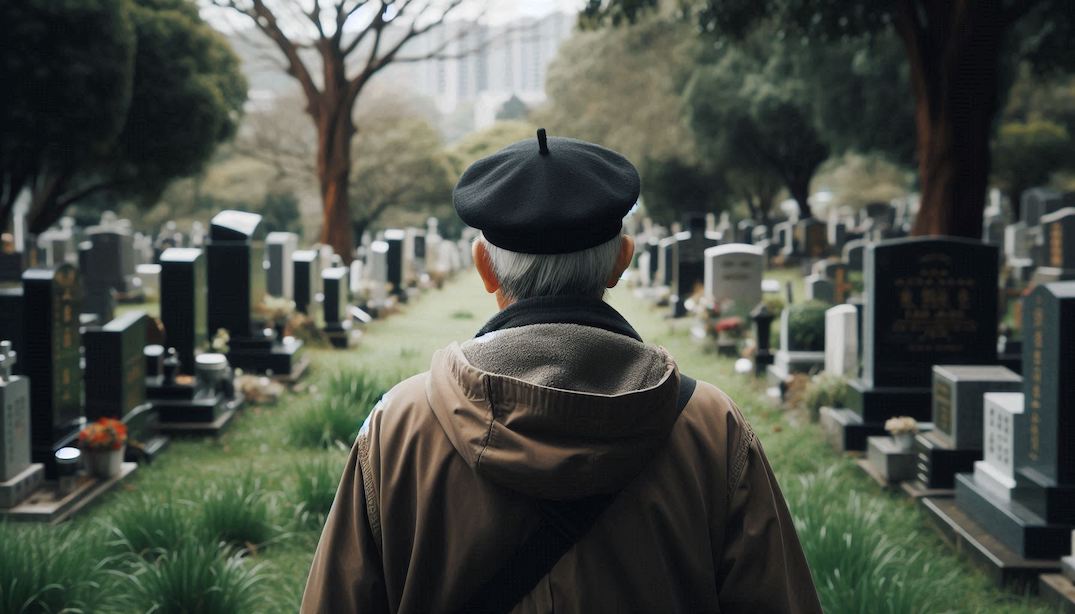
Today, I wandered alone through the cemetery, reminiscing about those who have gone before me: bishops, priests, monks, ancestors, grandparents, parents, uncles, aunts, friends, and siblings. Life is fleeting. One moment, someone is here; the next, they’ve become a part of history. No more chances to meet, chat, or share stories. What strikes me deeply is how, regardless of who we are, our final resting place is the same—a humble grave, a modest patch of earth, and a headstone marking our name, birth, and death.
Amidst the vast silence, I found myself recalling Khánh Ly’s voice singing Trịnh Công Sơn’s A Journey to the Beyond:
“After so many years, I’m still wandering
Where does this endless journey lead, wearing me out?
On my shoulders, the sun and moon
Shine through a hundred years, one realm to leave, one to return.”
By now, nearly 80 people—family and friends—have left me, averaging one per year. Just this year, I’ve lost five: one in Australia, three in the U.S., and one in Vietnam. As I age, I notice my circle of loved ones shrinking. Today them, tomorrow me. Every time I hear of another passing, I feel a pang of sorrow, wondering when my turn will come. But it will come—that’s certain. I console myself with Marcus Aurelius’s words: “Death smiles at us all, and all a person can do is smile back.” Even with this thought, there’s a restlessness, a vague anxiety about the human condition.
Is that all death is? The living placing us in a morgue, laying us in a coffin, and burying us? Is death simply leaving everything behind? Does it mean we’ll never see each other again, no more family ties, no more bonds between teachers and students, no more friendships? If that’s true, why does Vietnamese culture teach us, “Life is a temporary lodging; death is a return home”?
Life is brief: “Just 36,000 days—what is that? This fleeting world seems a mockery.” (Cao Bá Quát). No matter what we do or where we go, we only have 24 hours in a day and, at most, 100 years. Eventually, we must leave it all behind and return. But where to?
In reality, we return to our graves, to the cold earth, to the quiet cemetery—a place the living hesitate to join or aren’t ready for: “Remember, man, that you are dust, and to dust, you shall return.” Yet, from a spiritual perspective, our final destination could be Nirvana or Heaven—a realm of light, peace, and happiness—or Hell, a place of darkness, misery, and eternal suffering. Only two destinations exist, and each of us must choose. God doesn’t force anyone into Heaven, nor does He cast anyone into Hell.
As we prepare for the journey to our final destination, what will we carry? Who will we meet at the eternal station’s end? Reflecting on this, I recall an image of a wealthy man—a billionaire, perhaps—pulling a suitcase in one hand and a bag overflowing with gold and jewels in the other. But Death stops him and says, “Leave all that behind before crossing the threshold of eternity. On the other side, only merits and sins matter.” What will become of this rich man, who cannot take what he’s gathered and hasn’t prepared what truly counts?
Returning from the cemetery, I resolved to start anew for my future in the next world, where only merits or sins will be of value. But I still wonder: Where will I go? What lies beyond death’s door?
-Trần Mỹ Duyệt, PhD in Psychology-
November 2, 2024
All Souls’ Day
